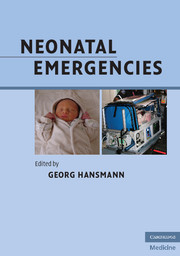Book contents
- Frontmatter
- Contents
- List of contributors
- Foreword (1)
- Foreword (2)
- Preface
- Acknowledgments
- Section 1 Organization of neonatal transport
- Section 2 Basics in cardiopulmonary resuscitation of newborn infants
- Section 3 Classic and rare scenarios in the neonatal period
- Section 4 Transport
- Section 5 Appendix
- Training NICU nurses and paramedics in the neonatal emergency transport service (NETS)
- Training delivery room staff in the resuscitation of newborn infants
- Web links: societies, hospitals, guidelines and learning programs
- Growth charts
- Bilirubin diagrams and transfusion exchange limits
- Aortic blood pressure during the first 12h of life in infants with birth weight 610–4220 g
- Laboratory: normal values
- Unit conversions
- References (Section 5)
- Index
- Plate section
Training NICU nurses and paramedics in the neonatal emergency transport service (NETS)
from Section 5 - Appendix
Published online by Cambridge University Press: 05 March 2012
- Frontmatter
- Contents
- List of contributors
- Foreword (1)
- Foreword (2)
- Preface
- Acknowledgments
- Section 1 Organization of neonatal transport
- Section 2 Basics in cardiopulmonary resuscitation of newborn infants
- Section 3 Classic and rare scenarios in the neonatal period
- Section 4 Transport
- Section 5 Appendix
- Training NICU nurses and paramedics in the neonatal emergency transport service (NETS)
- Training delivery room staff in the resuscitation of newborn infants
- Web links: societies, hospitals, guidelines and learning programs
- Growth charts
- Bilirubin diagrams and transfusion exchange limits
- Aortic blood pressure during the first 12h of life in infants with birth weight 610–4220 g
- Laboratory: normal values
- Unit conversions
- References (Section 5)
- Index
- Plate section
Summary
Training programs for neonatal transport will in part depend on:
The types of transfers to be undertaken
The range of anticipated conditions in the patient population
The background of team members
While training should focus on skill levels necessary to successfully transport patients rather than specific educational degrees, the recognition of transport as a specialist area within perinatal care has led to the establishment of academic courses for neonatal transport. Neonatal-trained nurses will in general have a large part of the requisite background knowledge and skills for neonatal transport. Paramedics will be familiar with working in a moving environment but will require intensive training to participate in “hands on” intensive care.
Basic training requirements should include
Organizational knowledge
An understanding of the logistics of the transfer process is essential. The best information about the infant's condition must be available to enable appropriate support to be given to the referring clinician and the appropriate decisions made regarding transfer.
Models of transport
Regional perinatal care
Hospital vs. transport environment
Principles of transport medicine
Initiation of transport process
Documentation
Communication during transfer process
Transport safety
Medico-legal issues
Viability
Public relations
Practical knowledge
Team members must be able to diagnose and manage the infant's problem and to identify the most likely reasons for deterioration in their condition. This level of skill is generally achieved and maintained only through significant experience in caring for critically ill infants.
Pathophysiology of congenital and acquired diseases of the newborn
Common conditions of the newborn
Normal/low-risk birth and neonates
Abnormal/high-risk birth and neonates
Transport physiology
Air-medical physiology
Stress management
- Type
- Chapter
- Information
- Neonatal Emergencies , pp. 509 - 510Publisher: Cambridge University PressPrint publication year: 2009



